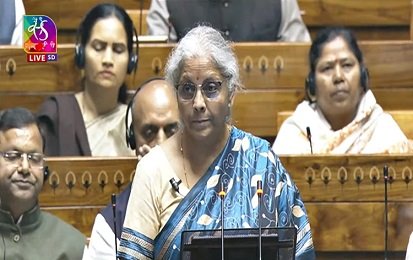
Last Updated on December 24, 2024 7:02 am by BIZNAMA NEWS
By Bibhudatta Pradhan / NEW DELHI
Multiple tax rates on popcorn varieties have sparked a heated debate, with economists, political leaders, and social media users criticizing the GST Council’s latest move and calling for a simpler tax structure.
The council’s clarification imposing three different GST rates—5% for salted, 12% for pre-packaged, and 18% for caramelized popcorn—has been slammed as a betrayal of the original promise of a ‘Good and Simple Tax.’

“This is a national tragedy,’’ said former Chief Economic Adviser Arvind Subramanian, who had chaired the committee on possible tax rates under GST in 2015. This is “violating the spirit of the Good & Simple Tax the GST was meant to be.’’
“ The folly is compounded because instead of at least moving in the direction of simplicity, we are veering to greater complexity, difficulty of enforcement & just irrationality. Sad,” he posted on X.
Former Chief Economic Adviser K.V. Subramanian echoed similar concerns, stating on X, “Complexity is a bureaucrat’s delight and a citizen’s nightmare.’’
The seven-year-old Goods and Services Tax continues to face mounting criticism for its rigid structure and convoluted administration. Past controversies, such as the different rates for parotta and roti, curd and yogurt, and plain buns versus cream buns, have underscored the system’s inconsistency and susceptibility to disputes.
Experts argue that the multiple tax slabs not only fuel classification disputes but also create uncertainty and drive up compliance costs. This has, in turn, triggered a surge in GST-related litigation, further escalating the cost of doing business in India.
“This is silly and complex. It will lead to tax terrorism,” Former Infosys CFO Mohandas Pai wrote on X, adding that it is making citizens “hostages to rent-seeking officials” and creating endless disputes.
Some decisions of the GST Council aim to provide relief, while others have added to the prevailing confusion. Payment aggregators handling transactions below ₹2,000 have been granted relief. New electric vehicles (EVs) will continue to attract a 5% GST rate to encourage clean mobility adoption. However, used EVs sold by companies or modified for resale will be taxed at 18%, calculated on the margin between their purchase and selling prices.
The opposition Congress on Sunday asked that with the union budget now 40 days away, “will the PM and FM summon the courage to launch a complete overhaul and institute a GST 2.0?”“The absurdity of three different tax slabs for popcorn under GST, which has unleashed a tsunami of memes on social media, only brings to light a deeper issue: the growing complexity of a system that was supposed to be a Good and Simple Tax,’’ Congress general secretary in-charge of communications Jairam Ramesh said in post on X.





